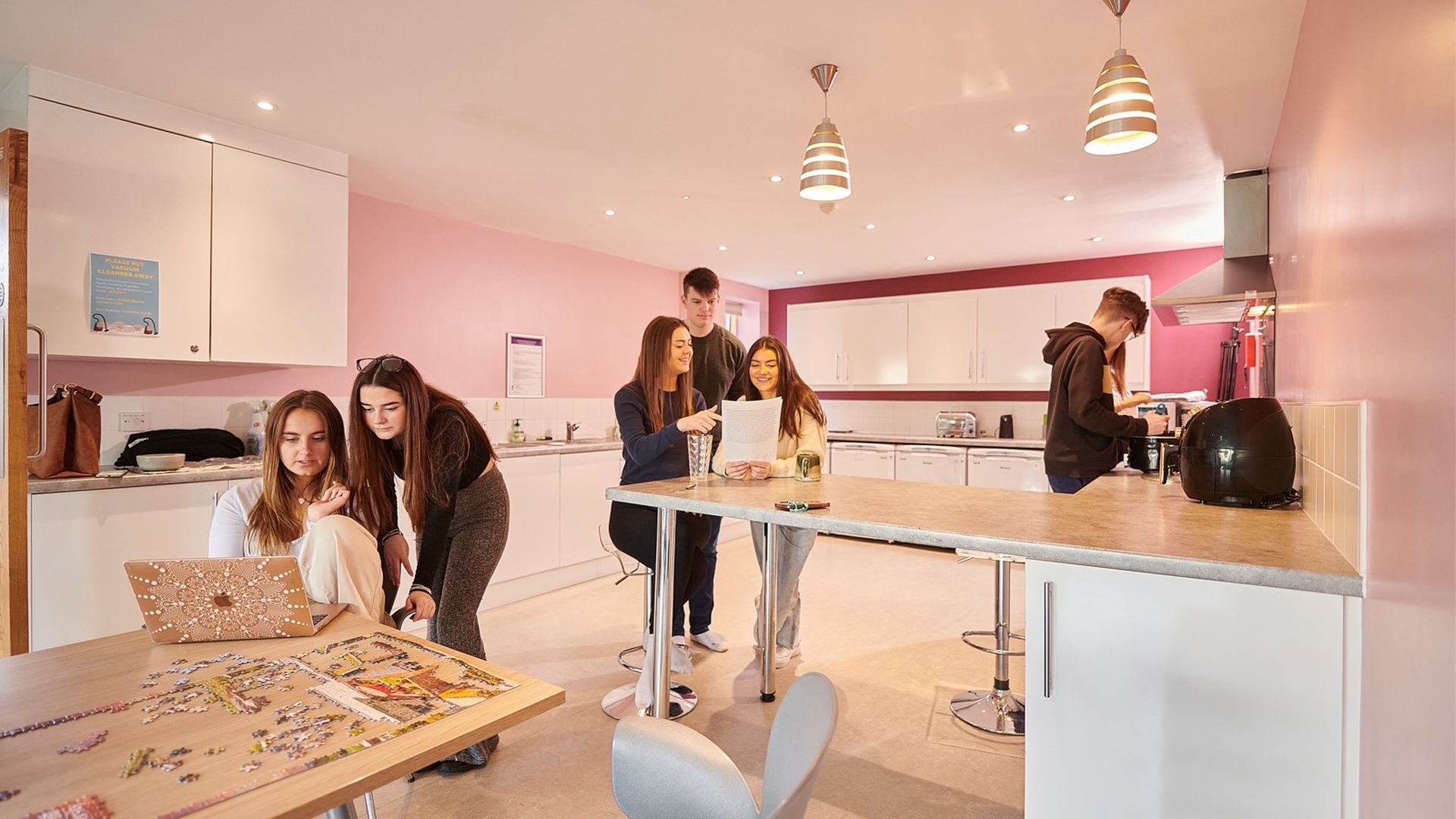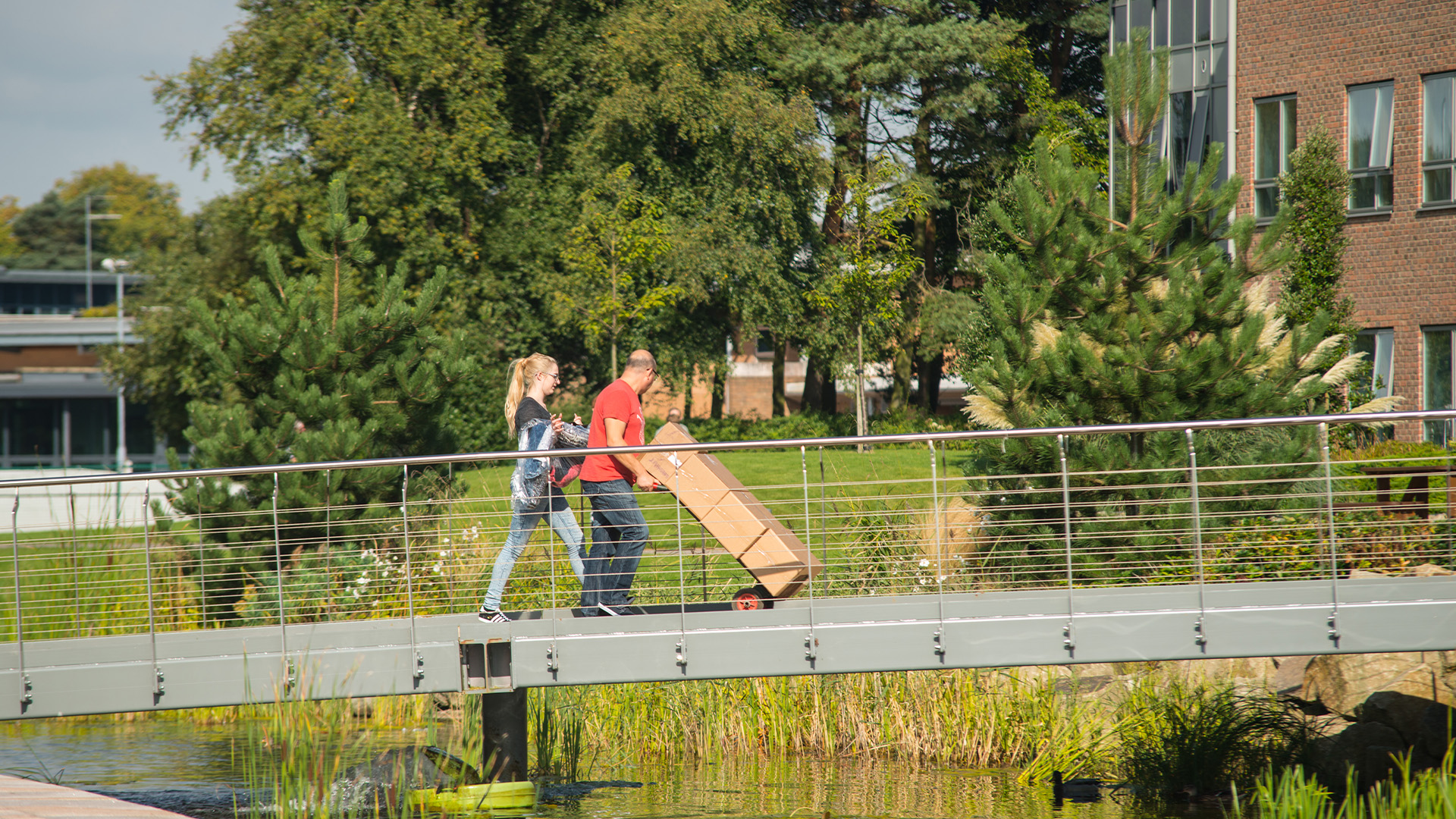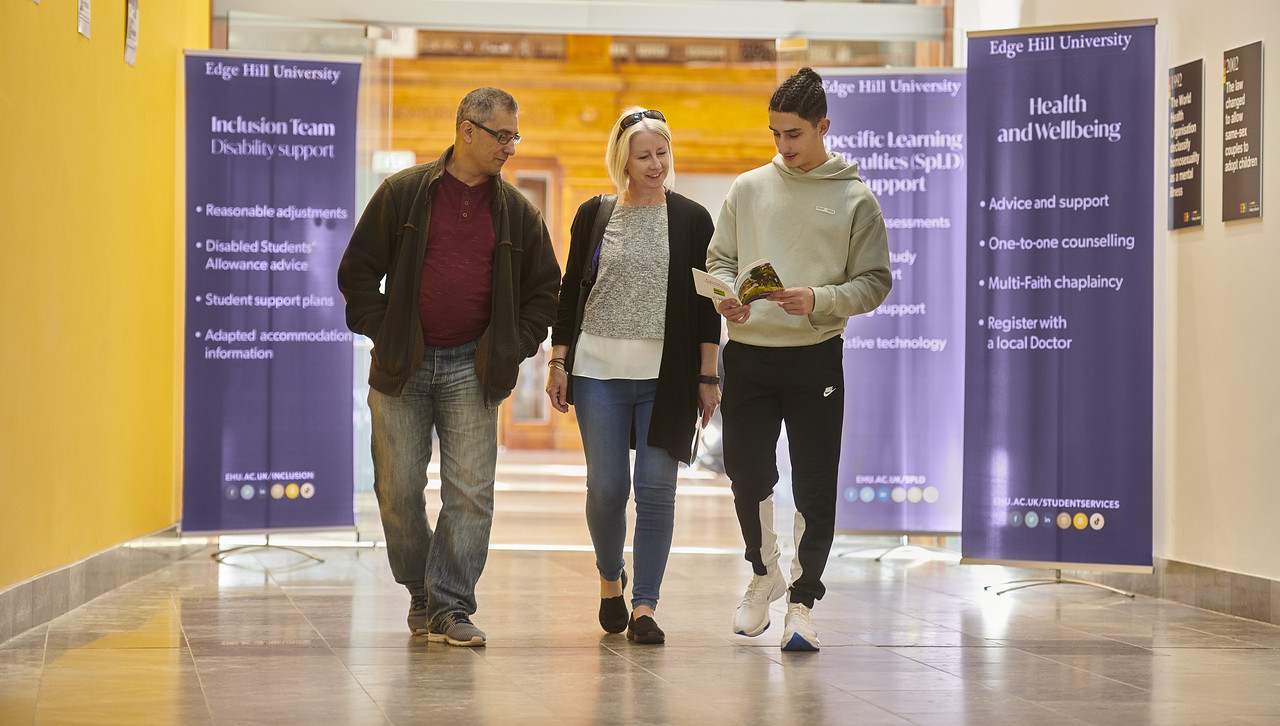
Explore the benefits of higher education and learn how to help your student to pick the right course and university for them.
There’s a lot to think about when deciding what and where to study. We recommend that a student should start their search early, around 18 months to two years before they want to start a course.
What we offer at Edge Hill
The following guidance can help you to see what kinds of activities you and your student might want to get involved with as part of their journey to university.
Our university FAQs
It’s about more than ‘just’ a degree. University provides so many opportunities and is a time like no other.
Your student can expect to:
- increase knowledge in their chosen subject
- think about career options they may have not considered before
- expand their social skills. Living away from home, making new friends, finding new interests, possibly studying abroad for a year are all things that will build and shape them
- develop transferable skills such as time management, meeting deadlines, problem solving and working independently.
The main difference between campus and city universities is that campus universities often have a closer community feel, with easier access to amenities. City universities, on the other hand, are associated with more vibrant nightlife and often have improved transport links.
Campus and city universities offer very different living, learning and teaching experiences. Choosing one or the other may mean a completely different time at university. So which is the right one for your student?
Let’s break down the differences between campus universities and city universities as well as their pros and cons:
There are lots of ways that your student can find out more about courses and universities to help identify a course they want to study.
- Research universities and courses – looking at prospectuses and websites with them is a great way to start. You should investigate course options, entry requirements and course content, as well as the location, accommodation and facilities at each university. The Discover Uni website may also prove useful as a means of comparing subject and course options with student satisfaction ratings and employability statistics for each degree.
- Attend a UCAS exhibition – a great way to speak to representatives from a large number of universities and colleges. It’s a chance to pick up prospectuses and ask any questions about universities of interest. These UCAS exhibitions take place across the country, with the majority between March and June. Encourage your student to attend one near you. They can attend with friends, alone, or even with you.
- Consider career options – careers advisers at school or college can help your student to think about potential career choices, identify relevant courses and provide practical advice on the application process. It’s important to give future career plans careful thought when choosing a degree. Some professions may require a particular subject to be studied or professional accreditation to be achieved.
- Visit universities – by far the best way to decide if a university is where your student would like to study is to visit. Open days offer a great opportunity to explore universities and get an insight into what the student experience is like. As well as open days, we also run monthly campus tours. And you’re invited along too.
Some of the key questions for your student to consider when identifying a suitable course include:
- what subjects do they enjoy or have a particular interest in?
- is there a specific career they have in mind?
- do they want to study at a campus or city-based university?
- do they want to stay near home or move a little further away?
- how will the course be structured – for example, are there optional module choices or are all modules compulsory?
- how is the course assessed?
- does the course carry accreditation with a professional body (if applicable)?
Your student should also look at the entry requirements. These are usually based on UCAS tariff points which correspond with A Levels, BTEC awards, Access to higher education diplomas and other recognised qualifications. Some courses may request grades in specific subjects. Additional criteria may also apply, such as GCSEs, or Disclosure and Barring Service (DBS) Enhanced Disclosure.
Encouraging them to talk to teachers, careers advisers, and professionals in relevant fields for advice is also a good starting point. We also recommend booking a Subject Taster Day to experience what studying their chosen subject will be like, so they can make the right choice with confidence.
Book a Subject Taster DayChoosing the right course is important. But choosing the right environment to live and study is just as important too. As well as researching universities that offer degrees related to their subject of interest, they should consider factors like:
- Location – does your student want to stay close to home and commute to campus, or are they open to moving away and studying in a different town or city?
- Rankings – reviewing university rankings can help your student access the reputation of a university and how well it performs in important areas like teaching quality, campus and facilities, graduate outcomes and student satisfaction.
- Culture and environment – what are the values of the university and how is this shown on campus? Students may look for certain values that align with their own to help decide where they will ‘fit in’.
- Extracurricular opportunities – are there any clubs, societies and opportunities available, like study abroad or language learning, that align with your student’s interests?
- Funding – are there any bursaries or scholarships available?
- What current students say – hearing first-hand from students can provide invaluable insights into what university life will be like.
Universities offer a range of degree options to suit your student’s interests and learning style. Some degrees offer more hands-on experience in a chosen industry or field of work. Others are lecture and seminar based relying more on independent study. Some degrees even allow students to work in existing organisations alongside their studies, tailored towards a particular occupation or industry. These include:
- Bachelor’s/Honours degree: usually studied over 3 years or may include an optional placement year. Read our types of degrees guide.
- Degree apprenticeships: Work-study degrees where your student will gain practical experience while earning.
- Foundation degree: usually studied before a Bachelor’s degree, topped up to a full Honours degree at a later date, or ideal your student is looking to gain an undergraduate qualification without committing to a Bachelors course. It’s equivalent to the first two years of a degree level programme.
- Top-up degree: Used to top up an existing level 5 qualification to a full level 6 degree (Bachelor’s/Honour’s).
- HNCs (Higher National Certificates): Vocational courses focusing on specific skills and industries.
As a parent or supporter, this is probably an area you’ll be very interested in.
Typically, all students are able to borrow the full cost of their tuition fee from the Government in the form of a tuition fee loan (subject to eligibility).
A maintenance loan is used for general living costs is paid in three instalments throughout the year directly into a nominated bank account. The amount of maintenance loan a student receives is determined by household income, whether your student chooses to live on or off campus, and other criteria.
There are also grants, bursaries and scholarships that some students will be able to benefit from. For all the information, please visit our fees and funding webpages.
Get all the information on the UCAS website and our applying through our UCAS webpage.
You can also find further guidance on supporting your student with applying on our dedicated preparing for university page.
Understanding the jargon
Universities use a lot of words that you might not be familiar with, so we have compiled a list of common higher education and university terms and outlined what they mean. What’s the difference between an unconditional and conditional offer? What does DBS mean?
Explore our university jargon-busting guideGet in touch
If you have any queries, please get in touch and our team will be happy to assist you.








